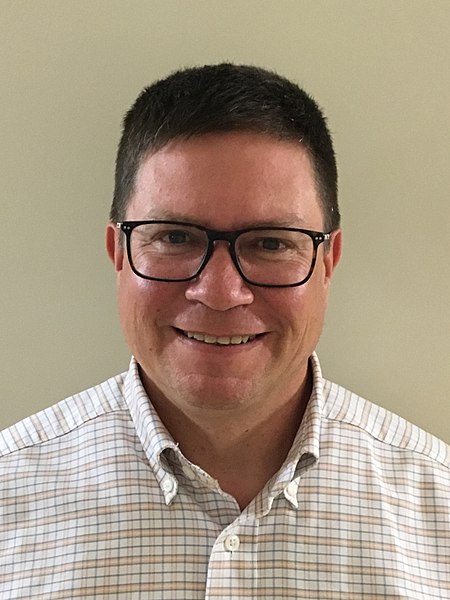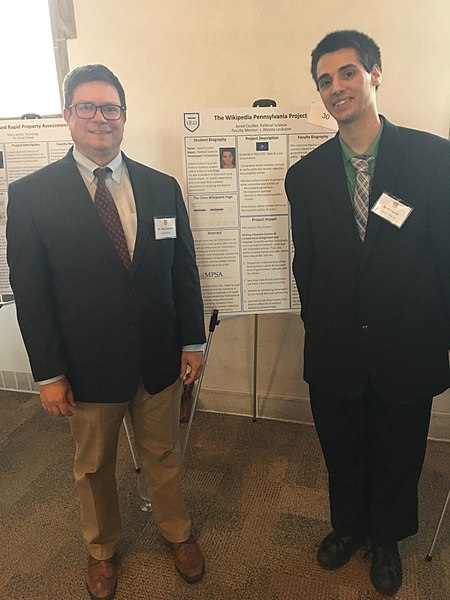Dr. J. Wesley Leckrone is Associate Professor of Political Science at Widener University. Here, he reflects on teaching with Wikipedia in a public policy course.

Image: File:Leckrone Headshot.jpg, AmPartnership, CC BY-SA 4.0, via Wikimedia Commons.
Two years ago at the Midwest Political Science Association (MPSA) Annual Conference I walked by an exhibit that piqued my interest. The MPSA and Wiki Education had partnered to engage academics and their students in projects to make Wikipedia articles more accurate and academically rigorous. I immediately thought – what a great way to make writing assignments more relevant! Instead of handing in papers that would be graded and then dropped in the recycling bin, why not have students’ writing leave a lasting imprint that would help others learn?
This motivation for using Wikipedia in class was well intended but not developed enough to realize the full benefits of the activity. When I added it to the curriculum of my Spring 2017 State and Local Government class I saw it as merely replacing traditional writing projects. However, the experience taught me that writing articles was only one way that the Wikipedia experience contributed to the class learning outcomes. I had traditionally used papers as a means to evaluate student’s knowledge of class content. For the most part I had farmed out learning the craft of writing to the English Department. The experience in State and Local Government showed me that the process of writing could achieve important objectives related to political science. The first semester of using Wikipedia was a test run that helped me develop a more comprehensive system.
My Fall 2017 Public Policy class provided the opportunity to more intentionally design the Wikipedia assignment. The class of 23 students was composed mostly of sophomore Political Science students since it is requirement for the major. Students were assigned a 6 week Wikipedia training session and then placed in groups of 3-4 students tasked with adding content and at least 30 sources to 2-3 Wikipedia articles. The total assignment amounted to 18.5% of the final course grade.
I wanted to give students ownership of the potential project topics so I set aside a class to brainstorm about potential issues. The content of the class focused predominantly on federal policy so I asked students to think about areas where they might do research on state policies, although that was not mandatory. I also suggested that they might want to focus on issues that were less controversial in order to avoid conflict in their groups. Students wanted no part of that advice and by the time we had winnowed down the list of possibilities we ended up with six topics: abortion, criminal justice reform, the death penalty, disaster relief, gun rights/regulation, and immigration (including the Deferred Action for Childhood Arrivals program). Students joined groups based on their policy interests and then identified specific Wikipedia articles to revise. The groups had the rest of the semester to complete their assignments. The final three classes were spent peer editing and making presentations about the policy issues discussed in their Wikipedia entries.

Image: File:Wikipedia Pennsylvania Project Poster Session.jpg, AmPartnership, CC BY-SA 4.0, via Wikimedia Commons.
This project achieved three primary learning objectives, two by design and one by chance. First, civic and political engagement is part of Widener University’s mission and naturally an important component of the curriculum in the Political Science Department. Projects in this area typically involve creating and executing advocacy campaigns or organizing and attending campus events related to contemporary political topics and events. The political engagement involved with the Wikipedia project was profoundly different. Students were tasked with sharing their knowledge on larger scale by adding to entries that were open to the global community. As a class they added more than 23,000 words on issues of great importance to society, thus helping make Wikipedia a more complete source of information to citizens.
Second, I focused heavily on the importance of finding good sources of information and the need to provide objective, fact-based writing for the Wikipedia articles. We discussed the differences between objective reporting based on research and investigative practices versus opinion pieces driven by partisan politics and ideology. The objective was to learn how to write effectively and in a non-biased manner. As a political science professor this is particularly important given the current environment of fake news and partisan media. The project was one more tool to help students develop critical thinking skills and the ability to more effectively express their thoughts.
Finally, one learning objective emerged by chance. I had initially tried to steer students away from tackling controversial policy issues. However, they chose some of the most contentious topics possible. I embraced this by focusing on how the groups would need to confront differences in opinion on issues and achieve consensus in order to improve the articles. The core lesson was that they needed to find a common ground based on facts rather than opinions in order to effectively write on Wikipedia. In the present political climate achieving this one objective made the entire project worth it.
Want to teach with Wikipedia? Visit teach.wikiedu.org or reach out to contact@wikiedu.org to learn more.

Great idea! Thanks for posting.